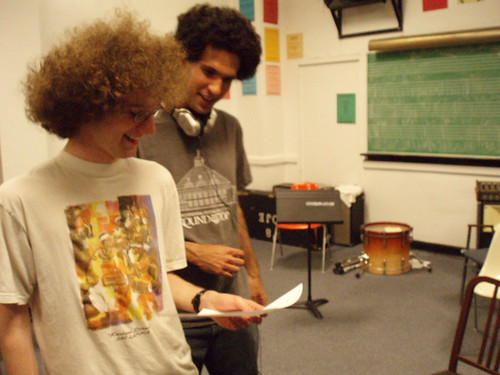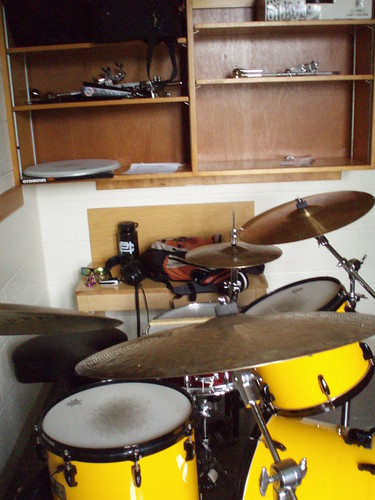Oberlin Blogs
Opportunities for College Musicians
June 12, 2008
Will Mason ’10
When I applied to Oberlin, I knew very little about the school except that it was a small liberal arts college with a phenomenal music conservatory. That was enough to get me to apply and as I did more research - discovering that the college was phenomenal,too, and that a $5 million gift for a new jazz building had just been announced - it became clear quickly that this was the right place for me. I came here as a college student hoping to profit from the conservatory without having to enroll, and although I was indeed able to do this, I ended up transferring into the double-degree program. In this post, I'm going to attempt to enumerate the various ways in which college kids can benefit from the conservatory; I am a jazz musician, and as such can only give personal testimonial to that aspect of the program, but I will try and relay pertinent anecdotes from other divisions of the conservatory as well. This post should be thought of as a supplement to the information available directly from the conservatory, rather than as the definitive account of the musical happenings at Oberlin.
From the outset, it's important to note that the conservatory and its faculty are first and foremost obligated to meet the needs of its students. It has been my experience that faculty members are always happy to meet with college students, but the extent to which they can adopt non-conservatory students depends on the size of the studio in a given year. I was fortunate during my freshman year that two freshman jazz drummers left the program; the jazz studio is relatively small in size and so this was a palpable loss and created a void that I was able to opportunistically fill. I first had to audition in order to be able to sign up for small ensembles, and upon being approved was easily able to find musicians willing to subject themselves to my playing. I was also able to sit in on a jazz performance class taught by members of the jazz faculty, which I credit as one of the most helpful learning experiences I've had at Oberlin in terms of getting up to speed as a jazz drummer. In this class I was introduced to Billy Hart, the jazz drum set professor, and after hearing me play he graciously offered to give me lessons, which I took for half credit during spring semester.

Billy Hart with The Bad Plus (from left, Dave King, Hart, Ethan Iverson, and Reid Anderson) at NightTown in Cleveland, September 2007. After the show I interviewed Iverson for The Grape, which was great fun.
My experience is neither unique nor commonplace. Trying to study with a conservatory professor is like trying to take an upper-level seminar in a subject that isn't your major: if the instructor has room and if you demonstrate your willingness to learn and work at a high level, you stand a good chance of getting in. You aren't guaranteed a spot, but you also aren't summarily dismissed.
At the beginning of each school year, students interested in taking lessons and playing in ensembles must audition in front of the division faculty, and they are placed according to ability and availability. Conservatory students also teach secondary lessons, and anyone who is unable to study with a faculty member can receive a weekly half-hour lesson from a conservatory student. As the students giving lessons are themselves receiving instruction from the faculty, a lot of college musicians wind up following a regimen of study identical to that administered to conservatory students. Additionally, studying with someone your own age can be a lot less intimidating than studying with someone who's performed with the New York Philharmonic, and as such the lessons may wind up being more fruitful.
Classes in the conservatory are generally available to college students; you need to speak with the professor first and they will usually let you into the course if you can meet the prerequisites. But be wary: I was able to get into a 200-level music history class my first semester, but had to drop it almost immediately when I realized I was in over my head. Some courses are harder to get into than others depending on the program and the year. For example, the "Studio Techniques" class in the Technology In Music And Related Arts (TIMARA) division is one of the most coveted courses in the school, so don't expect to get into that without a sterling resume of relevant work and a fair share of tenacity.

Hanging out in Hales Studio A, the main jazz rehearsal space. It does the trick, but we're eager for the new building to open.
Oberlin is overflowing with musical ensembles. There are over 400 conservatory-sanctioned concerts each year, not to mention innumerable student bands, a capella groups, folk singers, chamber groups, a steel drum band, et cetera. I can say with complete certainty that anyone possessing even a modicum of musical ability will find a group willing to welcome them with open arms. It is understandably harder to get placed in some of the large ensembles like the Oberlin Orchestra or the Contemporary Music Ensemble, though certainly not impossible and probably a bit easier than getting lessons with a professor. Conservatory ensembles require an audition, and it is usually the same as your lesson placement audition. The auditions are based on merit and not on your status as a college or conservatory student: after all, the ensemble directors are the ones listening to your audition and they want their orchestra to sound as good as it can. If you're someone with a lot to offer musically, they'll take notice.
Even if you choose not to participate in any ensembles and take no lessons, you still stand to benefit from the music at Oberlin simply by being immersed in Oberlin's musical culture. Some of the most important learning I've done at Oberlin has been from watching my peers perform. Concerts are one of the main recreational activities on campus; student bands perform in Wilder Bowl on Fridays when the weather's nice; every party has a band or a DJ; aloof voice majors stroll through Tappan Square humming themes from Schubert's "Die Winterreise." Not only is there music everywhere, but it's very good music. I went to a party at a certain small liberal arts college in my home state of Maine (rhymes with "toad in"), and listened to what I was told was the only student band on campus, and they were abysmal. At Oberlin, you get to see live music that people in the real world would pay a $15 cover charge and two-drink minimum to hear.

My practice room at the beginning of the semester. (Add about 40 empty coffee cups, scraps of paper, two large stacks of books, and a bunch of Ginger Chew wrappers to get an idea of how it looked at the end.)
The confluence of music and academics at Oberlin really does make it one of a kind. I looked at several liberal arts schools purported to have good music programs and none of them even began to approach what Oberlin has available in terms of material and intellectual facilities. (200 Steinways, 150 practice rooms, and a TIMARA lab are readily available for all students, not to mention the world-class faculty.) It is difficult to adequately discuss what opportunities are available for college musicians in the conservatory because of the variance in performers' backgrounds. I've tried to cover my bases but if you have any questions please ask me and I'll do my best to give you an answer specific to your circumstances. Also, I would encourage you to get in contact with some of the faculty in the conservatory dean's office, who are infinitely more knowledgeable about this subject than I and who can direct you towards more pertinent information.
Similar Blog Entries
Decisions, Decisions
April 4, 2025
Reflections on the college decisions I've made and have yet to make.

Lovely Day
March 30, 2025
My first visit to Oberlin, and what I learned — namely, to prepare for all kinds of weather (among other things).

Choirs and Orchestras and A Cappella Groups
March 19, 2025
What kinds of musical opportunities are there at Oberlin, if you're not planning on entering the conservatory? Quite a few.
